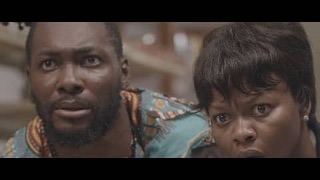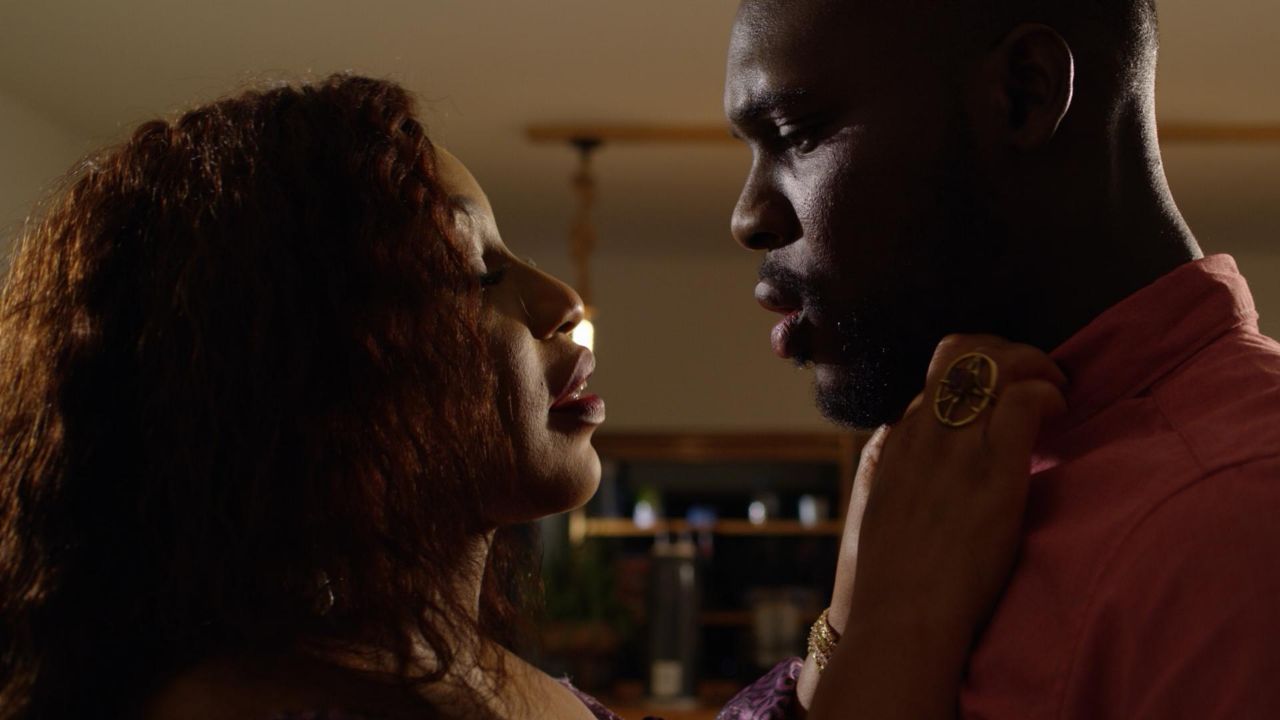Written by Samuel Udoetuk.
Picture this: Lit spotlights, a packed ballroom, a tall, elegant woman with the sharpest cheekbones you’ve ever seen walks forward, dressed like a 15th century English monarch. She glides across the floor, basking in the shock and adoration of the crowd, and walks up to two policemen who then slap handcuffs on her wrists.

Jennie Livingston’s 1990 documentary, Paris Is Burning, introduced many people to a world they’d never seen before, the world of ballroom. In this world, populated mainly by Black LGBT people, who have been cast off or forgotten by society, find family and loyalty in “Houses” and, through ballroom, are able to compete and perform for trophies and glory. Paris is Burning focused on the New York ballroom scene, and Madonna’s hit single, “Vogue”, brought even more attention to them.
FX’s POSE, created and executive produced by Ryan Murphy (American Horror Story, Glee) Brad Falchuk (American Horror Story, Glee) and Steven Canals, is an example of film/television about ballroom culture. Set in New York, in the late 80s-early 90s (season 2 even takes place in 1990, during the chart rise and pop culture dominance of Vogue). POSE is about a group of Black LGBT people within the ballroom scene. It tells the story of the outcasts, the forgotten, and the marginalised. It examines what it means for these people to live fully, on their own terms, even when the world has segregated them. It’s a show that’s funny, earnest, heartbreaking, and honestly, just great television. Everything— from the sharp, well written dialogue, to the complex characters, to the glorious costumes and infectious music— just works.
The show made history before it even aired in 2018, with the casting of five Black trans women as series regulars. These women, who would’ve normally been relegated to the sidelines, or completely absent, have been front and centre in both seasons of the show, playing fully formed and compelling characters. It also has the largest LGBT cast of any scripted series. The first season arrived like a cultural touchstone. It introduced us to stories we’ve never seen before, centred characters that have never been centred before, and gave talented creatives the opportunities they deserved.
In POSE’s cast of exuberant characters, Blanca Evangelista (MJ Rodriguez) is the emotional centre of the show. A revelation in the first episode forces her to change her perspective on life, and leads to her setting up her own house, the House of Evangelista. In ballroom culture, having a legendary house means creating and leaving a legacy, raising the next generation, and passing your knowledge down to them. MJ’s raw and emotionally honest performance is one of the strongest parts of the show.
“…in our world there’s only one way to leave something behind, proof that I was here, building a legendary house my way with my rules.”
-Blanca Evangelista, in the Pilot episode

We are also introduced to Damon (Ryan Jamaal Swain), another outcast with dreams of becoming a dancer, who moves to New York to follow them. Blanca picks him up off the streets and gives him a place to live, thus becoming the first member of the House of Evangelista. She also becomes a mother to Angel (Indya Moore) and Lil Papi (Angel B Curiel).
The conflicts begin when Blanca’s decision to start her own house puts her at odds with the ruthless, elegant and emotionally distant Elektra Abundance (Dominique Jackson), her own house mother. The rivalry between both houses, and the complex relationship between these two women, is a prominent part of the show.
From the very first episode, POSE set itself apart from the rest of TV, in several ways. From its devotion to camp, the almost overwhelming earnestness; its willingness to tackle “taboo” subjects such as sex work and HIV/AIDS, but primarily, and maybe even most importantly in its decision to tell the stories of Black LGBT people, specifically Black trans women.
The HIV/AIDS crisis of the 1980s and 1990s hangs over the show, depicted in subtle yet effective ways in almost every episode. The characters talk about people they know who are sick, people they’ve lost; some of them get tested several times; a nurse refuses to take food to a sick patient; characters visit their dying loved ones; a white housewife asks for a HIV test, to the disbelief and concern of her doctor; funerals become an almost regular occurrence in the second season. They rage about the public’s indifference, about being left to die.
Also, sex work is explored with a nuance that very few shows have. It’s not gratuitous, and it doesn’t demonise, it’s presented as a necessity, something that Angel, and several other characters need to do to survive, as they’ve been pushed to the edge of society. It’s through this work that Angel meets Stan Bowman (Evan Peters), a straight white executive working for Donald Trump (yes, that Donald Trump) and married with two kids. This relationship, between a trans woman and a cis straight man, is rarely touched upon in TV and film, and has real world impact.
In two seasons, POSE has explored the tensions between gay men and trans women, racism, sexism, transphobia, homophobia, gentrification, and the LGBT rights movement. It has also been a family drama, a coming-of-age story, and one of the best dance musicals you’ll see on TV. It does all these things, shifting tones almost with ease, embodying the full and complex lives of these characters, while fleshing out the glorious and gritty world of ballroom.
There’s something about the show that makes it feel grand, almost larger than life. The sweeping crane shots, the quick cuts, the whip-smart dialogue and over the top emotions. It’s almost melodramatic, which I admit, is hard to get used to, but once you do, you’ll love it. The opening sequence from the first episode requires a certain suspension of disbelief, but it will leave you GAGGED. The performances, from MJ to Dominique to Billy Porter, are almost theatrical in a way that shouldn’t work, but does. There’s an energy to this show, and it’s easy to get drawn in— to feel everything they’re feeling, to laugh when they do, and to cry when they do.

As watchable as POSE is, it’s not without its flaws. The dialogue tends towards exposition – characters over-explaining things to each other, for the benefit of us, the audience. I understand the necessity of it (we’re strangers to this world, and these explanations help), but it often comes off as clumsy. Also, the performances can be a little rough. This may be because for most of the cast, these are their first major roles, or even their first roles. Dominique Jackson’s performance, for instance, aims for a certain level of camp, but doesn’t always succeed, and can come off as grating. However the performances in the show do improve as the season progresses.
The characters are also kind of one note – Damon comes off as whiny and irritating, Elektra is a ruthless bitch, Candy (Angelica Ross) is loud and aggressive, but not much else. There isn’t as much nuance as there should be. Some moments are clearly written for the audience of 2020, and don’t fit the 80s-90s period. For instance, a line in Season 2 that’s intended as a Game of Thrones reference but is set almost a decade before the first book comes out. The flaws in how a certain character is written become even more tragic in an episode in Season 2. As previously mentioned, the earnestness can be overwhelming, and often becomes corny, and some moments are a bit too heavy handed (a song choice in season 1, episode 7, “Pink Slip”, was so on the nose, that I rolled my eyes). Some episodes are stronger than others, and after a while it becomes obvious that some writers (like Janet Mock) are better than others. But all in all, it’s still a great show.

The necessity of POSE can’t be understated, especially now. In TV and film, when it comes to the intersection of race and the LGBT community, most LGBT stories are overwhelmingly white (Queer as Folk, Will and Grace, Modern Family), and most Black stories are overwhelmingly straight, and cisgender (I love Insecure but…yeah). POSE is a show that tells the stories of marginalised people, that allows them to be more than side characters, that boldly and honestly confronts topics many shows simply do not have the range for. The TV show goes further to hire LGBT creatives behind the scenes, as choreographers,consultants, writers, and directors. Janet Mock became the first trans woman of colour to write and direct a scripted television episode, when she wrote and directed episode 6 of the first season, the excellent “Love is the Message”.
Unfortunately, there aren’t many shows like POSE, shows that make outcasts and marginalised people feel seen, make you laugh, make you cry, most importantly, shows that have broken boundaries and resonated with people. If you haven’t watched it yet, you should.
POSE is available worldwide on Netflix. The third and final season premieres on May 2, 2021.




2 Comments